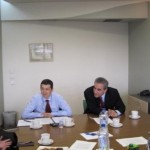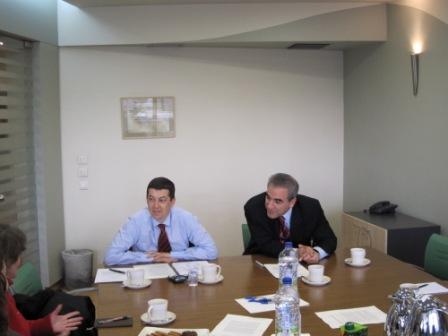 One year after the election of Barack Obama as President of the USA, it appears to be a different era in relations between the two sides of the Atlantic. The question, however, remains, how tangible is the change that the new administration has brought in transatlantic relations and how is this perceived in Europe. On this occasion, the Hellenic Foundation for European and Foreign Policy (ELIAMEP) organized, on Thursday 28 January 2010, a roundtable discussion with Francois Lafond, Director of the German Marshall of the United States (GMFUS) Paris office, on “Transatlantic relations – a view from France”.
One year after the election of Barack Obama as President of the USA, it appears to be a different era in relations between the two sides of the Atlantic. The question, however, remains, how tangible is the change that the new administration has brought in transatlantic relations and how is this perceived in Europe. On this occasion, the Hellenic Foundation for European and Foreign Policy (ELIAMEP) organized, on Thursday 28 January 2010, a roundtable discussion with Francois Lafond, Director of the German Marshall of the United States (GMFUS) Paris office, on “Transatlantic relations – a view from France”.
View from Europe: the “Relative Power” concept and the ‘Obama effect’
Acknowledging that global politics is conducted within a multipolar framework, the President of France, Nicola Sarkozy, has increasingly adopted the doctrine of the “relative power”, first presented by Pierre Hassner, whereby France is attempting to establish special relations with a number of key countries around the globe such as Brazil, India and Kazakhstan as well as enhancing relations with the USA. Similarly, since his election President Obama has also adopted a much more comprehensive approach to multipolarity, equally acknowledging that there is more than one key player in global politics while upgrading the participation of the US in the UN.
The election of President Obama has, reportedly, had a significant effect on the conduct of transatlantic relations as Barack Obama enjoys especially high rates of approval in the European Union as opposed to his predecessor, although it is interesting that the gap is much smaller in the new member states in the former Eastern Europe. As such, opinion polls in Europe record that Europeans are more willing to establish closer relations with this ‘new’ USA.
View from the US: Indicators of change
The appointment of new specialized personnel in key positions dealing with EU relations as well as the large number of trips President Obama has completed in Europe during his first year in office, are regarded as typical indicators of change. According to Mr. Lafond, while these actions are small, they indicate a shift from the preceding administration, which, on the symbolic level shows a higher US commitment towards Europe.
A second indicator is the significant change in the style and way of communication including President Obama’s rhetoric. Phrases such as the “war on terror” are hardly ever used today, while Obama, similarly to Sarkozy, is actively visible to the public promoting the idea of ‘political activism’ that ‘can make a difference’.
In addition to rhetoric, there has been a substantive change in US foreign policy. Afghanistan is now portrayed as the “war of necessity”, in cntrast to Iraq which is characterized as ‘a war of choice”. Consequently, efforts are made to increase further the allied military presence in Afghanistan while withdrawing from Iraq. Obama has also adopted a softer-policy approach towards Iran, and has taken steps towards the ideal objective of a nuclear-free world, by promoting the “Global zero initiative”. In parallel he has tried to deal with the Palestinian question early on in his first term in office while, finally, adopting a policy of rapprochement with Russia. These policy actions have actively contributed to the rapprochement of the two sides of the Atlantic as many of Obama’s initiatives are closer to the core of traditional EU values and policy-goals.
The challenges
Despite good intentions, however, the results of America’s foreign policy shift are not clearly visible, especially within the US where Obama faces a high degree of opposition from media and politicians alike. Equally, European public opinion remains largely unconvinced on the necessity of increasing their military presence in Afghanistan or of America’s good intentions to provide a solution in the chronic problems of the Middle East. In Iran, President Obama has found obstacles in Iran’s refusal to import uranium from the West; in the Middle East the Israeli government appears to be a difficult partner in finding a solution while the Palestinian government itself has proved to be unable to contain radical Hamas. The US openness towards Russia found a big obstacle on the Georgian crisis putting at strain relations between Russia and NATO as well, despite the organization’s softer approach to the idea of further enlargement which was anyway opposed by key European countries.
The question of NATO’s future and identity is an important challenge that Obama is called to deal with, where the central question is to define whether the transatlantic alliance is political or military and what positions role it can play in the new global setting.
Fundamentally, one year on, we still don’t know what kind of presidency will the US have and what kind of balances there will be between the US and Europe. While Obama appears to be more ‘European’ in values and policy orientations, the fact is that he is the president of the USA, an element often forgotten in Europe.
Will president Obama be able to deliver? There is a question that, as yet, remains to be answered.



